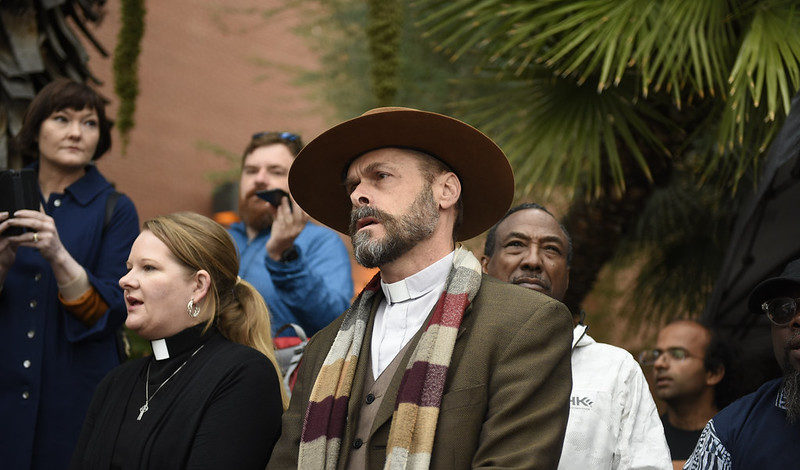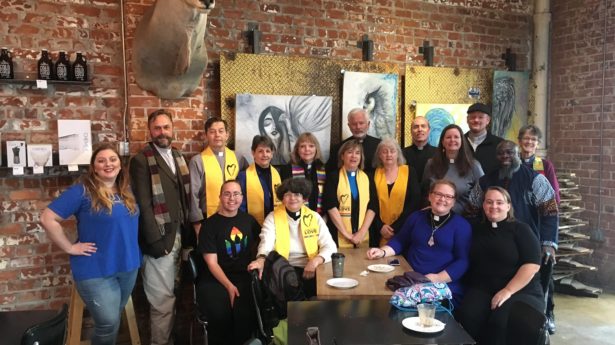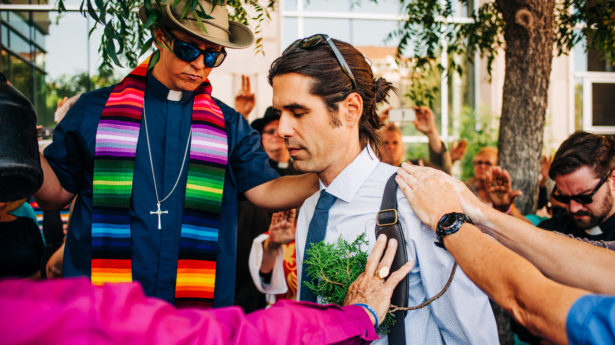The Unitarian Universalist Service Committee advances human rights through grassroots collaborations.
Life in the Borderlands: My Experience at the Scott Warren Trial

By Rev. Matthew Funke Crary on December 6, 2019
This is the personal account of Rev. Matthew Funke Crary, one of the many Arizona UUs who have been in solidarity with Scott Warren throughout his trial for assisting migrants traveling through the Sonoran desert. The spiritual leader of Borderlands Unitarian Universalist in Amado, Arizona, Crary recently attended the Faith Floods the Courtroom event in support of Scott Warren.
On November 20, when we heard the jury’s verdict declaring Scott Warren “Not guilty,” relief flooded the courtroom. Judge Raner Collins had warned us—Scott’s family and friends, humanitarian aid providers, and clergy of many faiths—about court room decorum, so the noise we made was not a joyful shout for justice, but of audible exhalation, the deep breath of a community that had been holding it for much too long.
Six and half years ago, I returned to Southern Arizona to serve the Borderlands Unitarian Universalist congregation (BUU). BUU is due south of Tucson, half-way to the U.S.-Mexican border. We serve retirement and rural communities up to 40 minutes to the north, south, and west. Through this ministry, I’ve reconnected with the beauty and perils of the Sonoran desert and met the resilient communities of people who call it home. As the beautiful desert and its landmarks, natural and constructed, have evoked my memories of growing up here, the border wall, the militarization of the desert, and the occupation of law enforcement certainly have not.
The years I’d been away, changes in immigration policy and politics had transformed the place and greatly impacted the peoples here. Where once crossing “the line” between countries was fluid, now it is constricted with concertina wire. Where once the danger here was due to temperature extremes and geography, now border patrol vehicles and helicopters and militant organizations engage in deadly hunts for migrants. Where ways were open, now roads are littered with checkpoints where all are subject to questioning and inspection.
Since I’ve returned, I’ve not met a soul who accepts these changes as normal. Instead, individuals and communities have learned to cope with them, and for those who believe these policies are inhumane, actively resist them. People like Scott Warren, and others in No More Deaths, People Helping People, and the Samaritans, dedicate their time and resources in compassionate and heartfelt struggle. They hike out to trails where migrants have died to leave life-giving water and food for those who may come along next. They document the enforcement changes and the impact on the people and the land. They defy the inhumane polices and policing that are now a part of everyday life in the borderlands.
In the last two years, as immigration politics have become more aggressive, the enforcement of the policies have followed. I’ve heard of the increased threat through the experiences of migrants coming to BUU out of the desert seeking aid, and from local people through the discovery of the body of a migrant abandoned by a road near our church. I’ve observed National Guard convoys bringing soldiers and security equipment to the border and their military exercises. And through UUSC and its partnership with No More Deaths, I’ve become aware of the increasingly dire tactics used to intimidate humanitarian aid providers in the borderlands and in the courts.
Over the last several months, as I have moved in and through the borderlands communities, I have heard individuals name—and have felt myself—the weight of the trials bearing down on our lives. Law enforcement citing and trying humanitarian aid providers isn’t new to the borderlands, but in a time of aggressive enforcement, the felony and misdemeanor charges and trials of Scott Warren had a considerably more oppressive impact. The trials were focused on the compassion, beliefs and actions of one man, yet in their blatant attempt to criminalize compassionate action, they directly impacted the many communities of borderlands resistors. Knowing that humanitarian aid is never a crime, we were undeterred in our daily acts of compassion with migrants. Yet, these are the very actions that Scott was being tried for, so we found ourselves asking the ominous question, “When will they come for the rest of us?”
As more of these aggressive policies have been enacted, the presence of Unitarian Universalists traveling to Southern Arizona has been a blessing. Religious professionals have come as a part of UUSC’s efforts to bring national attention to the situation and the humanitarian crisis. Alongside people of other faiths, UUs have come, heard our stories, and accompanied us into the desert to offer life-giving aid. Through the “Faith Floods the Desert” action in the summer heat of 2018, and the “Faith Floods the Courtroom” presence earlier this year, I remain deeply grateful for the solidarity we have shared in this justice work.
As Judge Collins read the verdict the afternoon of November 20, I was sitting in the courtroom, holding hands with my friend and colleague, the Rev. Bethany Russell-Lowe, minister of the Unitarian Universalist Church of Tucson. As each member of the jury rose individually, and one at a time confirmed their verdict of not guilty, Bethany said it was like hearing a litany. It was like the voices of our southern Arizona community were breathing deep and speaking out in affirmation of compassionate action over inhumane policy. While we still have the work to end migrant deaths in the desert and our government’s abusive policies, we are so affirmed in that work by UUSC, UUs from near and far, people of many other faiths, and this victory through our federal court system. We can breathe deep in this broad community, celebrate in gratitude, and get back to work.
Photo Credit: Ash Ponders
***
About UUSC: Guided by the belief that all people have inherent worth and dignity, UUSC advances human rights globally by partnering with affected communities who are confronting injustice, mobilizing to challenge oppressive systems, and inspiring and sustaining spiritually grounded activism for justice. We invite you to join us in this journey toward realizing a better future!

